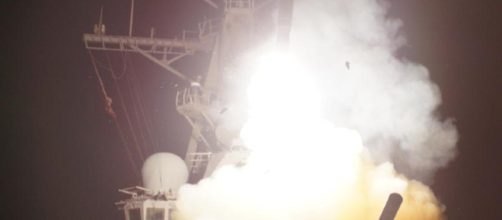Since the end of the Cold War, the United States has been the undisputed leader in military technology. The Pentagon has incorporated this knowledge into foreign policy strategies since its lightning victory during the First Gulf War. However, the period of undisputed American military dominance has come to an end according to Department of Defense officials in Washington. On Wednesday, the Deputy Assistant Secretary of Defense for Strategy and Force Development publicly warned that America is at least a "decade" behind Russia and china in terms of military research and development.
Elbridge Colby, while discussing the new National Defense Strategy paper with the Pentagon, claimed that U.S. foreign policy needs to focus more on the military threats arising from Moscow and Beijing. While admitting that Islamic terrorism is still a serious threat to American foreign and domestic policy, DOD Secretary Colby warned that an aging military infrastructure could leave America vulnerable to Chinese or Russian attacks.
Colby's dire warning comes at a time when the administration of President Donald Trump is touting new foreign policy successes with North Korea and Russia. On the other hand, Democrat-driven fears about Russian election interference in 2016 has resulted in fresh sanctions against President Vladimir Putin's government.
As for China, Congress has passed a series of tariffs designed to weaken the growing economic might of China and its Communist party.
Moving ahead
According to Colby, China and Russia are moving ahead of the U.S. "across all domains" when it comes to military advancements. In the South China Sea, Chinese ships have created artificial islands that allow Beijing to land aircraft and base naval warships. Both China and Russia have also developed ballistic missiles that cannot be accurately intercepted by America's missile defense systems. "While China and Russia are driving through generations of ASAT systems every three to five years, it is taking us over a decade to even begin to field a system responsive to their first-generation threat," Colby warned.
ASAT is an acronym for anti-satellite weapons systems.
Another doomsayer, William Carter of the Center for Strategic and International Studies (CSIS), fears that China has already become the equal of the U.S. in regards to electronic warfare, hypersonic weapons, cyber espionage, artificial intelligence, and other cutting-edge methods of warfare. A lot of these advances can be tied to Chinese economic espionage and criminality, with President Trump and his supporters warning that wanton copyright infringement in China is helping Beijing flourish at the expense of American businesses, entrepreneurs, inventors, etc. As warned by Politico, the Chinese Communist Party has also infiltrated American universities thanks to government-supported institutes that operate as part of Chinese student groups.
What is next?
Carter, Colby, and General Robert Kehler (Ret.) all agree that the American military is dangerously close to losing its comfortable advantage over its enemies. This threat is particularly acute in space, where Russian and Chinese satellites are capable of striking U.S. military and industrial satellites. Such hypothetical assaults could seriously disrupt civilian communication systems along with the general infrastructure of the U.S.
So far, the Trump administration has outlined how it plans to combat these threats:
- Increasing funding for the U.S. military
- Engaging in a "trade war" with China in order to disrupt the growing Chinese economy
- Seeking closer relations with Russia over matters of international terrorism
All of these approaches, along with a multi-party resolution to the issue of a nuclear North Korea (which receives support from both China and Russia), could strengthen America as a whole.


